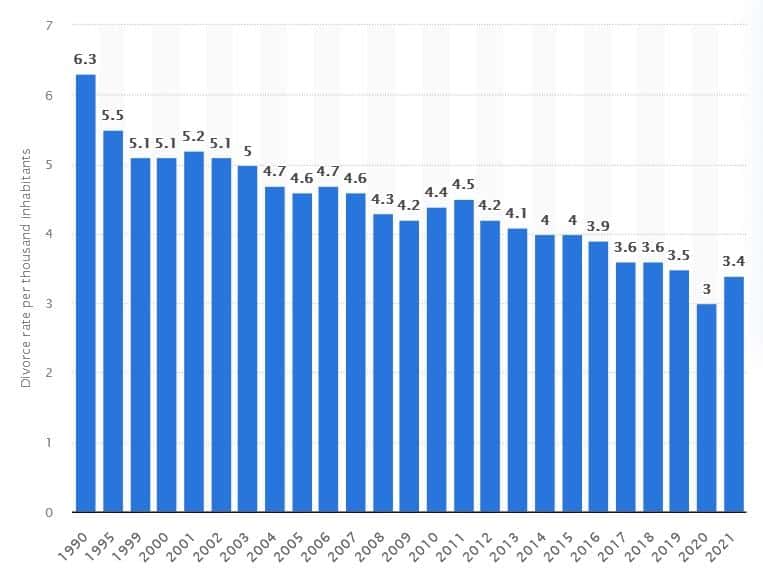“When people divorce, it’s always such a tragedy. At the same time, if people stay together it can be even worse.”
Grounds for divorce in Florida
One of the most common grounds for divorce in Florida is insurmountable differences between the spouses. This means that the situation has reached a dead end and the couple can no longer compromise and find reasons to save their marriage. In such cases, both parties should agree on child custody, payment and amount of alimony, and division of property before the divorce proceedings begin.
Another ground for divorce under Florida law is the mental incapacity of one of the partners. If one of the spouses suffers from a mental illness or is officially recognized by a psychiatrist as incapacitated at least three years before filing for divorce, this may be a valid reason for divorce.
Infidelity can also be a serious reason for divorce. However, it will be difficult to prove adultery if you do not have hard evidence, such as photographs or videos confirming the commission of such actions.
The following chart provides statistics on the divorce rates in Florida from 1990 to 2021:

No matter what your reason is for filing for divorce in Florida, you should consult with an experienced family law attorney who knows the local laws!
How does residency affect the rules and requirements for filing for divorce in Florida?
The process of divorce begins by filing a petition for divorce with the clerk of court in your county. In this document, you explain why you are requesting a divorce and what compensation you want to receive from your partner, such as the amount of alimony. You must also send your partner a copy of the petition and a summons to appear in court, which he or she must respond to within 20 days.
After your spouse is familiarized with your decision to dissolve the marriage, he or she must inform you whether he or she is satisfied with the terms you have specified. If he or she accepts the terms you propose, you can begin negotiations to resolve the conflict without going through lengthy and costly court proceedings.
In cases where the spouses cannot reach an agreement on issues related to their divorce, such as the division of property or child custody arrangements, it is better to seek the assistance of an experienced attorney-at-law who specializes in family law and can ensure that your interests are protected at every stage of the process!

Division of marital property
According to divorce law in Florida, the division of marital property must be equitable. That is, all marital property, real estate, vehicles, bank accounts, investments, and other assets acquired during the marriage will be equitably divided between both parties. However, this does not necessarily mean equality, as the court will take into account the financial needs of each spouse and their financial contribution to the marriage.
In cases where the spouses cannot agree on how to divide the property between them, the judges make their own decisions based on several factors, including the length of the marriage and the financial contribution of each party. For example, if one of the spouses did not work, supported their partner in their desire to build a career, and stayed at home raising their children, this may lead to an unequal division of property after the divorce.
It is important to note that separate property owned by each spouse before marriage or received as an inheritance/gift during marriage is not subject to division under Florida law unless it is mixed with the spouses’ funds/assets. In any case, the assistance of an experienced family law attorney guarantees the protection of your rights at every stage of the divorce!
Alimony and spousal support laws
Florida law may require one of the spouses to pay alimony or support one of the partners after a divorce. This is possible in cases where one of the spouses has a higher income, which creates an imbalance of financial resources.
When deciding on alimony, the court takes into account the age, health, earning capacity of each partner, and the duration of the marriage. The court may award temporary or permanent alimony payments depending on what is considered fair in the circumstances.
It is important to note that if you are planning to receive alimony after a divorce; then it is worth using the services of a family law attorney who has a thorough knowledge of the local law. He or she can guarantee that all your rights will be protected during the court proceedings!

Rules for child custody and visitation after divorce
Florida divorce law requires that child custody and visitation arrangements be determined with the best interests of the child in mind. When making its decision, the court considers each parent’s ability to meet the child’s physical and emotional needs, their moral character, and their willingness to help establish a relationship between the child and the other partner.
In most cases, Florida courts order joint custody because it allows both parents to continue to be involved in their children’s lives even after the divorce. However, if one parent has a history of abuse of the child or the other partner, the court may award sole custody.
Florida divorce laws also provide guidelines for financial support for children until they reach the age of 18, even if one of the parents is not the custodial parent. The amount of support is calculated based on the income of each parent, as well as any special needs of the child, such as medical or educational expenses.
It is a good idea to use the services of a lawyer who knows how to resolve child custody issues and will ensure that your rights are preserved during the trial!

How to calculate child support correctly
According to Florida divorce laws, alimony is determined based on several factors, such as the income of both parents and the number of dependent children. The state uses a special formula to calculate the amount of child support as a percentage of each parent’s net income. It is quite difficult to understand this issue on your own, so it is very important to seek the help of an experienced family law attorney who understands these guidelines and knows the rules for calculating child support.
Also, when determining alimony in Florida, the costs of health care, kindergartens, and other expenses related to raising children are taken into account. In addition, the amount of child support may be affected by the fact that you have unforeseen special needs or circumstances.
It is important to note that child support obligations exist until the child reaches the age of majority unless the child is attending high school full time even after the age of 18, in which case the payments will continue until the child graduates or turns 19. If you need help with important issues during your divorce, including calculating your potential financial obligations to support your dependent minors, you should seek the services of a qualified legal advisor!
Requirements for mediation before the court
If the parties are unable to reach an agreement during mediation, they may continue the trial, where a judge will decide on all disputed issues. If the parties manage to reach an agreement, it should be discussed in court before the agreement comes into force. It is worth noting that the settlement of all issues through mediation will help reduce the overall cost of the trial.
Divorce in Florida requires several complex legal procedures, including how to get a divorceper the place of residence, equitable division of property acquired during the marriage, and mandatory pre-trial mediation aimed at resolving disputes without a lengthy litigation. The assistance of an experienced family law attorney guarantees the protection of your rights at every stage of the divorce!
Contested and uncontested divorces in Florida
A contested divorce in Florida occurs when the parties disagree about any aspect of their divorce. This can include disputes over child custody, property division, or alimony. Contested divorces tend to take longer because they require lengthy negotiations and litigation, which will require more financial and mental energy.
Regardless of whether you are going through a contested or uncontested divorce in Florida, it is important to find an experienced attorney who specializes in family law. He or she will help you through every step of the process of divorce, including filing the necessary paperwork, negotiating custody, property division, and alimony, and attending hearings before judges/mediators/arbitrators. This will ensure that the final decision in court will be made following the terms of the divorce agreed upon by you and your partner.
Disclaimer:
The Information shared in this Article is taken from online research and references given below. These laws might change with time. The information shared in this article is not relied upon without the advice of an Authorized Attorney. It is therefore highly recommended to visit expert Attorney for best, latest and updated information.
References:
- Press Advantage. Florida Divorce Attorney Russell Knight Discusses the Grounds for a Divorce in Florida. https://www.digitaljournal.com/pr/florida-divorce-attorney-russell-knight-discusses-the-grounds-for-a-divorce-in-florida
- Divorce rate in Florida from 1990 to 2021. https://www.statista.com/statistics/207147/divorce-rate-in-florida/
- Dividing Money and Property in Divorce. https://www.justia.com/family/divorce/dividing-money-and-property/
- Florida Quick Divorce Online. https://floridaonlinedivorce.com/
- Jeffrey Johnson, J.D.Florida Alimony & Spousal Support (2023 Guide). https://www.forbes.com/advisor/legal/divorce/florida-alimony/
- Corina Bölsterli. Requirements and Basics of Mediation. https://www.linkedin.com/pulse/requirements-basics-mediation-corina-b%C3%B6lsterli-maier/
